Emerging Voices
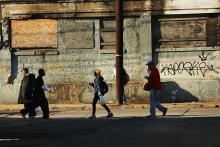
I recently heard that the state of New Jersey plans to evict the Camden Children's Garden from its 14-year-old home.
I don't know if you know much about Camden, N.J., but it's one of the cities in our country that wrestles with a myriad of social issues. There are a number of incredible people there that work tirelessly to improve the living and social conditions. Mission Year has spent a number of years living and working beside neighbors and friends in this city. The people there are very committed to things like improving housing, education, and tackling food desert issues, and they have very little resources with which to work.

Five year-old Tony Amorim sat with his dad in a van in Danbury, Conn., in 1989.
“Do you want to come with me,” his father asked him, “or do you want to stay with your mother?”
Tony loved them both, but the boy couldn’t imagine living without his father.
“I want to go with you,” Tony answered.
Right then and there Tony’s father drove away and took him to the far-away land of Florida.
Last week, I interviewed Tony, now 28, on the phone. I couldn’t call him directly because he is in Norfolk County Correctional Center awaiting his deportation hearing scheduled for today.
Tony’s voice was tight. He was eager to share his story — his whole story.
On the face of it, his case is simple. According to a Notice to Appear, issued to him by the Department of Homeland Security, Tony is a native and citizen of Brazil who entered the U.S. through Orlando, Fla., on a Nonimmigrant Visitor for Pleasure Visa in 1985. In 1995, Tony was granted Lawful Permanent Resident status by an immigration judge. He was 11 years old. In 2004 he was arrested and convicted for possession of narcotics. Four years later he was arrested and convicted again for possession of narcotics with intent to sell and for possession of a pistol.
It sounds like Tony is the poster child for the kind of person who should be deported: two felony convictions and possession of a gun. But you haven’t heard the whole story.

Listen, I’m not here to bash Manti. I’m not here to ridicule or mock him. I’m not even suggesting that Manti is lying or that his statement is not accurate but we can all agree that the whole story is absolutely bizarre and the total truth has yet to be fully revealed. But because I’m a believer in people – and more so – because I believe in the power of redemption, reconciliation, and restoration, I want to see Manti do well – not just as a football player – but as a man … as a human being … and as someone who often speaks of God.
If I were Manti’s pastor …
While more details will emerge in the future, I wondered what kind of advice I would give him if I were Manti’s personal pastor. (Manti, being Mormon, is supposedly a deeply religious person.) Here are the four pieces of advice I’d give him.

On New Year’s Eve I wrote “The Top 10 things I’m thankful for in 2012” on my Facebook page. Number four was “Clarity of call and message.” A friend asked in a comment below the post: “How in your own life has this played out? I'm at a crossroads here and It's difficult for me to discern this right now … Feel like I'm just drifting.”
Many of the people sitting in pews across America understand what my friend is going through. “Drifting,” that’s how he put it. In fact, I think it’s a question many people are wrestling with in their daily lives. There are so many issues out there. There are so many hills to die on. There is such deep division in our politics and in the church. Wading through the sound bites gets tiring. How can one make sense of it all? It’s tempting to just give up and disengage like the many Christians did in the mid-20th century.
But we cannot.
At 14 years old, Sydia Simmons was kicked out into the streets of New York City by her alcoholic mother, but today she is a wife, mother, and founder of the Lost Angels Society.
The purpose of the Lost Angels Society is to provide a safe space for homeless teens. Sydia knows firsthand the difficulty of being homeless, especially in New York City, and because she has overcome through her faith she wants to give back.
On Dec. 16, 2012 Sydia hosted the Lost Angels Society Benefit to give homeless youth a Christmas celebration. This benefit was supported by actress Uma Thurman, superstar singer Usher, and many others.
Sydia truly has compassion and a passion for homeless youth, and an important message for the Church. Isaiah 61: 3-4 states: “They will be called oaks of righteousness, a planting of the Lord for the display of his splendor. They will rebuild the ancient ruins and restore the places long devastated; they will renew the ruined cities that have been devastated for generations.” Sydia truly fits the description above because she is rebuilding the lives of teens devastated by homelessness.
Reconciliation is never easy, which is why it doesn't happen very often. Reconciliation is not something that can be checked off of a list. It is not a single event encapsulated in a moment of time. Reconciliation begins with a conversation and ends with a relationship restored.
It was the morning of Dec. 19, and I was standing in front of the U.S. Capitol building in Washington D.C. I had reserved that space months in advance so I could host a public reading of H.R. 3326, the 2010 Department of Defense Appropriations Act. I did this because page 45 of this 67-page document contained an "apology to native peoples of the United States." In three years this apology had not been announced, publicized, or read by either the White House or the 111th Congress.

What would Jesus do with guns?
Would he own guns? Sell guns? Perform miracles and multiply guns for 5,000 people? Would he use guns? Would he ask his followers and disciples to own guns? I’m no expert on the topic of Jesus and guns but I do know Jesus and for this Jesus who encouraged people to “turn the other cheek” and gave encouragement to be “peacemakers," my guess is that he wouldn’t be a member of NRA.

As I write, I'm stuck in the Central Wisconsin Airport (near the bustling metropolis of Wausau, Wis., for those keeping score at home). And, you guessed it, I'm waiting. Fog in Minneapolis prevented our plane from landing there, and now I'm left sitting in a very small regional airport with no restaurant and no coffee and no concrete sense of what the rest of my day will look like as I make my way to California. All I can do is wait.
I do know, barring something entirely unexpected, that I'll eventually make it to San Francisco. Right now I'm living the axiom offered by Tom Petty decades ago: "The Waiting is the Hardest Part."
Advent, a season during which Christians honor and attempt to approximate the longing for a Messiah more than 2,000 years ago, is often described as a chance to exercise our patience muscles. Advent can serve as a season of anticipation and hope and longing, void of desperation. This is Advent for those who already have most of that for which they wait. But for countless people around the globe, every additional day of waiting comes with a heavy price.
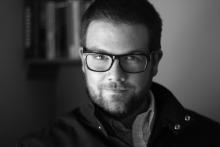
Adam Nicholas Phillips: Chris, tell us a little bit about yourself.
Christopher LaTondresse: As the son of American evangelical missionary parents, I spent several formative years living in the former Soviet Union — Novosibirsk, Russia to be exact — smack dab in the middle of Siberia. My family is originally from Minnesota, so I was convinced that they were trying to find the one place on the planet colder than our home state to do missions work.
Growing up as a missionary kid, my parents taught me to take my faith seriously, to take Jesus seriously, no matter what the cost. Their example — leaving the trappings of an American middle-class lifestyle behind to pursue something they believed in — sticks with me to this day. The major lesson: There are things in this life worth making exceptional sacrifices for, especially things close to the heart of God.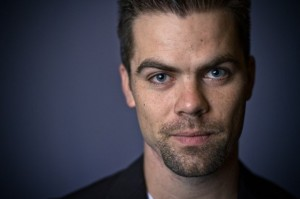
I guess this is really what informs who I am, and animates my work today. True, I’m not a full-time missionary, but I’ve tried to devote my life to playing a role, however small, in what God is doing in the world. For my parents this was about planting churches and, to use the language of the Navigators (the missions organization that sent them) “making disciples”. For me it’s about taking Jesus seriously when he said, “What you do unto the least of least, you do for me.”
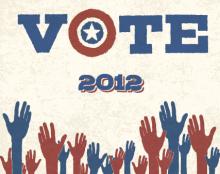
My early voting ballot is almost complete. I have done my reading, finished my research, and ignored a sufficient amount of robo-calls and attack ads. I have made my choices for county school superintendent, state representatives, and even U.S. Senator. But there is a gaping hole at the top of my ballot ...
It is November 6, 2012, and after more than a year of carefully following the presidential campaigns I still do not know which candidate I am going to vote for. I am an independent voter but registered as a democrat. On my Facebook page I identify my political position as "a morally-conservative Democrat or a fiscally-irresponsible Republican."
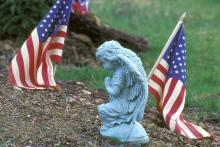
It’s here, God — Election Day in America. Today is the day when Americans everywhere are given the privilege and responsibility to exercise dominion (agency) at the polls.
Scripture tells us every human being is made in the image of God. We are, therefore, equally worthy of protection of the law. The United States Constitution and its Amendments tell us we are equally worthy of life, liberty, and the pursuit of happiness. Yet, at this very moment, laws stand poised to snatch dominion from the hands of the poor, the weak, and the vulnerable, ethnic minorities, students, and the elderly. Some scurrilous elected officials have worked behind the scenes to suppress the ability of voters to elect the person of their choice — all for the sake of politics

I’m tired of reading blogs from my White Christian brothers about why they are choosing to vote. There. I said it.
I’m all for being a part of the democratic process, but it seems a bit odd to me that so many of these bloggers are coming from a position of power and privilege they themselves have always had. It seems a bit arrogant to choose something that was always theirs.
The way I see it, they had better vote. The vote of the White male is what finally allowed people like me – a woman, an immigrant, a non-native English speaker – to have the right to vote. I didn’t have a voice. I didn’t matter. Neither did my ancestors, who immigrated here under quota systems developed by people in power for the benefit of the country and the powers-that-be.
And there still are people who have no voice, who have no right to vote, but they are directly impacted by the politicians, referenda, judges, and local officials as well as the “agendas and policies.” As a Christian who is new to the process, its a privilege and responsibility I don’t take lightly because it isn’t a given. I’m not American born. We are not post-racial America, and the fact of the matter is the church isn’t either. We are working on it, but we aren’t there.
Did you know that in 1882 Congress passed the Chinese Exclusion Act denying citizenship and voting rights to Chinese Americans? Yup, they could build the railroads but they can’t vote.

Next week I will vote for the first time in a presidential election. I became a naturalized U.S. citizen two years ago, giving up my Korean passport, my (not)green card, and pledging allegiance after having lived in the U.S. since the spring of 1971.
I actually studied for my citizenship exam out of fear and habit – fear that the wrong answer would mean restarting a process that had cost money, time, and emotions, and habit because I grew understanding not studying was not an option. The process actually took years for me, wrestling through ambivalence, frustration, grief, and gain to get to a point where the privileges, advantages, and necessities of becoming a citizen and my faith as a Christian pushed me over the edge.

If I had to translate her words into Navajo, I would say “ádin.” Ádin means nothing, none, zero.
I couldn't believe my ears. I was visiting Iowa in the first week of January during an election year. Presidential candidates were crisscrossing the state — kissing babies, shaking hands, and pleading for the vote of everyone they met. Campaign events were taking place in high school gymnasiums, community centers, and local businesses throughout the state. Many of the people I met had personal stories of meeting one of the candidates, shaking their hands, and talking about their issues. There are 99 counties in the state of Iowa, and a few of the candidates were taking the time to stop and hold campaign events in each and every one of them. But there I was, just a day before the caucuses, standing in the community center and tribal offices of the Meskwaki Settlement near Tama, Iowa, with the tribe’s executive director telling me that not a single presidential candidate had held a campaign event in their community.
I shouldn't have been surprised. After all I live on the Navajo Reservation. Our reserve is nearly 26,000 square miles with about 300,000 enrolled tribal members, and I cannot recall in my lifetime a presidential candidate visiting our reservation and campaigning directly to our people.
I’VE ALWAYS LOOKED forward to Advent. It’s a time each year of expectant hope—the hope brought by the coming of a child, born in an animal stall in Bethlehem, who would change everything. It is the time of year when I am reminded again of the choice we always have between cynicism and hope. That’s ultimately a spiritual choice, and Advent is a formative season that nurtures the choice to hope, which can guide our decisions and actions.
This fall, Sojourners launched a new project called Emerging Voices, and it’s one of the most hopeful initiatives I have been involved with in a long time. It aims to mentor, develop, and promote the most dynamic up-and-coming communicators—speakers, preachers, and teachers—who are called to lead and publicly articulate the biblical call to social justice.
The vision for this project is exciting and something to be celebrated. It also calls to mind a critical observation: Our world often wants saviors, not prophets; new messiahs, not leaders. We want heroes with superhuman strength who save the day, not mere mortals who speak the truths we typically don’t want to hear. Even the modern-day giants of social justice—Dr. Martin Luther King Jr., Dorothy Day, and Mahatma Gandhi, for example—were at best prophets, but never saviors.
It’s easy to slip into the mentality that one person, one voice, will rise up in a generation, and that she or he will change the world as we know it. Dr. King spoke of this temptation as the “drum major instinct.” It is the basic desire of humans to lead the charge and, ultimately, reap the recognition—or, at the very least, to place our confidence in a single human being.

Play along with me. If you had $1 million to spend to help stimulate the economy, what would you do? What would I do?
Option 1:
Give the money to a billionaire, in the blind hope that the billionaire will pass along that million to his employees in some form. Or that he’ll spend it on a nice luxury product that (hopefully) will be an American product. Or that he won’t exercise the many loopholes that still exist and he’ll give that whole amount back to the U.S. government to spend. And of course, pray that the money won’t go into an offshore investment account somewhere in the Caribbean or Switzerland.
But what would Jesus do? What investments would Jesus make that I would want to make as well?
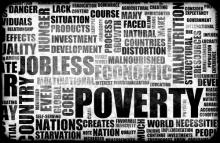
When I was a 17-year-old senior in high school, I was in several Advanced Placement courses. As the school year drew to a close, I wanted to take the AP test that would allow me to attain college credit. The AP tests, however, were very, very expensive. I went to my guidance counselor. She said that they could waive the fees for the exams if I qualified for the school’s free lunch program.
I had avoided the free lunch program for years. I had been on the free lunch program in elementary school and middle school but was always embarrassed by it. So when I got to high school, I didn’t apply for it. I picked up a part-time job so I could pay for my own lunch. But now, I wouldn’t be able to take my AP exams if I didn’t fill out the free lunch program form.
So I agreed to fill out the form. Later that day, my guidance counselor sent a student aide with the form to my social studies class room, where in front of the entire class, she declared that I needed to fill out the free lunch form. I remember the shame of not only my classmates laughing at me that day, but my high school teacher bursting out in laughter as well.

Note from Jim Wallis: On October 25, Troy Jackson wrote this piece for God’s Politics. He called for a “media fast” on November 2 — today. I thought this was a compelling idea so I am putting it out there again. So Turn Down the Noise: Fast, Pray, and Vote — today or one of the days before the election. Read and heed.
I was a teenager when the rock and roll "documentary" Spinal Tap premiered. Like many in my generation, I love the scene when Spinal Tap member Nigel Tufnel (Christopher Guest) proudly shares with reporter documentarian Marty DiBergi (Rob Reiner) that the band's special amp has dials that go up to eleven:
"You're on ten here, all the way up, all the way up, all the way up, you're on ten on your guitar. Where can you go from there? ... Nowhere. Exactly. What we do is, if we need that extra push over the cliff, you know what we do?" Marty responds, "Put it up to eleven," and Nigel emphasizes the point: "Eleven. Exactly. One louder."
This election season, I have come to believe that Nigel was on to something. You see, here in Ohio we have seen political advertising go "one louder" and receive "that extra push over the cliff." The NOISE is so deafening, I'm convinced the campaigns and super PACs have discovered a way to turn the dial all the way up to 11!

For the next 12 days it’s all about the ground game. With most voter registration deadlines passed, the fight against voter suppression has shifted focus from registration drives to calling banks, car-pools, and calls to vote early.
Bishop Dwayne Royster is Executive Director of P.O.W.E.R. (Philadelphians Organized to Witness Empower and Rebuild), a 37-member interfaith organizing coalition in Philadelphia. Royster is also lead pastor of Living Waters United Church of Christ in Philadelphia. In a recent interview Bishop Royster explained just how vital the fight against voter suppression has been for the people of Philadelphia.
According to a study conducted by the Pew Charitable Trust’s Philadelphia Research Initiative, Philadelphia is the 6th poorest large city in America with a poverty rate that held at 25 percent in 2011. The unemployment rate is higher than the national average at 11.5 percent, and nearly half of all high school students engage in a fist fight at least once in the course of a year. Tensions are high in the City of Brotherly Love.
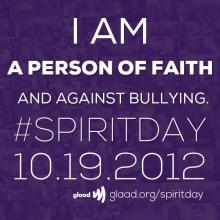
Twenty-five cents was all it took. It was like magic. The punches stopped and for the first time in a long time I felt what it feels like to be normal — to be safe, to be lovable, to live without a target on my back.
But even the transaction was not a guarantee of love.
Though I continued to bring quarters that fed the monster’s craving every day, after a while even their magic stopped working.
The torture started again on the playground after school.
I walked across the schoolyard and headed home, which was only a half-block away from the school. Suddenly I was surrounded by Alice and her goons. She taunted me and pushed me, then punched me. It didn’t stop. It became a ritual.
Soon, every day, armed with only my book bag, I would duck my head and make a beeline for my house and Miss Burton (the babysitter). And every day Alice and her bulldogs would hunt me down and taunt me and push me and punch me as I walked the looooong half-block home.
Mom asked one day what I was doing with all those quarters. When I told her, she marched up to the school and had it out with Miss Williams and then my principal. I was only in that school for one year.
Alice wasn’t the last bully I had to survive. There were others. There was Tracy in the fifth grade and two white girls whose names I’ve blocked out in eighth grade. For a long time I thought I must have an invisible target attached to my back.